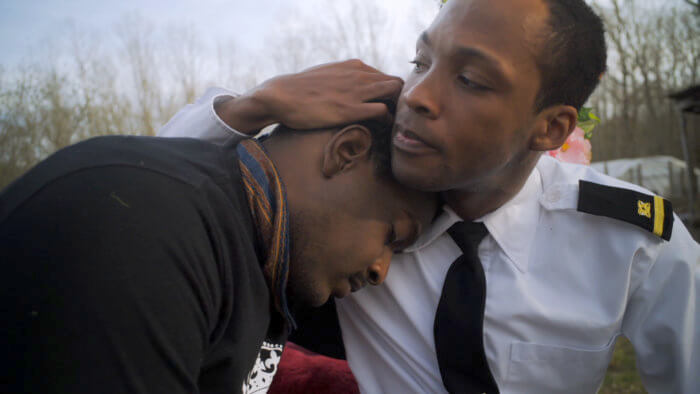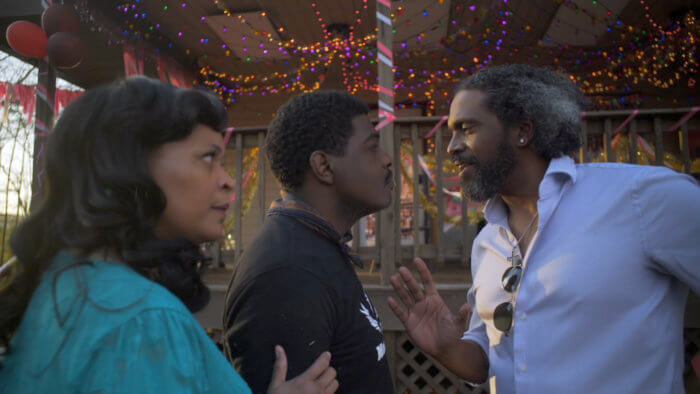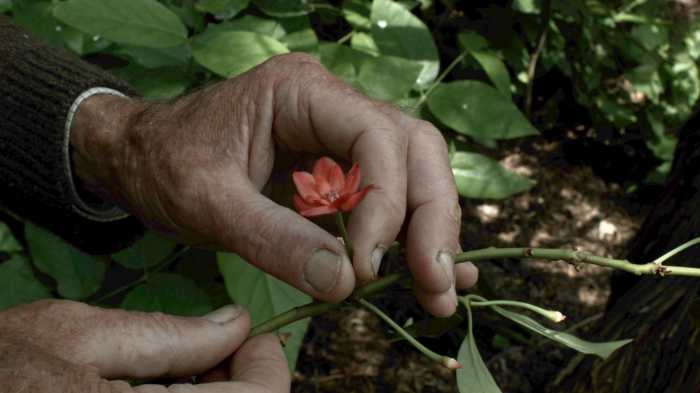Picture: Your father’s died and your mother’s just married his brother. Your father’s ghost appears, tells you that his brother murdered him, and commands you to murder your uncle back. But you don’t. No, you make this all about you. You claim agency and your right to DECIDE to do it. Of course, you can’t decide, which drives you, then others, mad. So, instead of one guy, just about everybody in your crew — including you — ends up getting whacked. Moral: Choices suck; you’re TRAGIC.
You’re also Hamlet. In Western literature, there’s probably no greater existentialist chump than Shakespeare’s damned-if-he-be; damned-if-he-NOT-to-be Hamlet. Over the centuries, the renowned straight-white-male Prince of Denmark has been played by actors of various races and genders. In fact, in early 2020, just before COVID set in, two Black women, Cush Jumbo (Lucca in “The Good Wife”) at London’s Young Vic, and Ruth Negga (Mildred in “Loving”) at Brooklyn’s St. Ann’s Warehouse, portrayed the doomed prince, to fair amounts of acclaim.
But what if your inability to take action in the world didn’t automatically mean that your world must end? Forget innovative casting; what if you made this tragedy into a comedy, where people without a lot of choices — who’ve already endured hard times, death, and crappy plot twists — choose to go ahead and live?
Thanks to the Wilma Theater in Philadelphia, “Hamlet” has now become “Fat Ham,” the flavorful story by playwright James Ijames, of a tough, turbulent Black family that runs a barbecue restaurant in the American South. Here, the only people to die are a couple of roaring, self-righteous patriarchs — and that’s no tragedy.
Hamlet himself is now Juicy, the plump and tender son of Tedra, whose husband was killed while doing time in prison. Juicy, an asthmatic, self-proclaimed “big ole sissy,” spends his time pensively on his laptop, attending a for-profit university and hoping for a future in personnel management.
Rather than the classical five-act opus, the play, directed by Morgan Green, takes place pretty much in real time on the porch and backyard of Juicy and Tedra’s home. We open as Juicy and his best friend Tio (“Horatio” to you English majors) are decorating the yard to celebrate his mother’s wedding to — how did you guess?! — Juicy’s uncle.

Tio, a pothead who embraces life through talk therapy, is probably the show’s most clear-sighted character. He passes down some wisdom from his therapist, reminding Juicy that his father was in prison — and his father before him, and his father before him — and before that, slavery: “You’re carrying around your whole family business, man. Don’t let that define you.”
Once Juicy is alone, Pap, his dead father, appears, and reveals that Rev, Juicy’s preacher-uncle hired somebody in the joint to stab him five times with a sharpened toothbrush. When Juicy seems reluctant to take revenge, his father sneers, “You pansy ass puddle of spit — whose side are you ON?”
“I’m not sure,” Juicy answers. “I gotta ponder…”
Enter Tedra and Rev, fresh from getting married. To get the party rolling, they feel obliged to tell Juicy that they’ve just squandered his college tuition money on their wedding, plus redecorating the bathroom. Though heartbroken, Juicy tries to be a good son by donning a party T-shirt emblazoned with a crown and, under it, “Momma’s Boy.”
The strained festivities continue as Larry, an elegantly attired Navy officer, and his sister Opal, a sullen bull dyke, show up at the party with their mother, Rabby, a church lady who’s forced Opal to put on a dress. Of course, these characters were once Laertes, Ophelia, and their father Polonius in Shakespeare’s original. And, though a good deal of the current plot is given to barbecue, karaoke, and king-conscience-catching charades that don’t quite work, a few almost-Shakespearean lines survive. “The king, my queen,” Juicy declaims to his mother, “is dead.”
“You watch too much PBS,” says Tedra. “You quote that dead-ass white man one more time…”
Reviews have called “Fat Ham” hilarious — and there are laugh-out-loud lines (“What’s wrong with being weird?” “It ain’t Christian”). But though the play is comedic, there’s too much Black life running through it to stop at being funny. Besides Pap, Prison is another spectral presence; the plastic yard furniture, cheap balloons and streamers, the disposable cups and utensils have, after all, cost Juicy his college tuition.

Rev — totally missing Larry’s huge crush on his stepson — is mightily impressed with Larry in his action-doll uniform. He admonishes Juicy to be a MAN like Larry, “with GOALS and hirable SKILLS!” Although Juicy and Rev face off a few times, the prospect that Juicy will avenge his father is beside the point; the real question is what the youth will do with their lives. In fact, each of them — Juicy, Tio, Opal, Larry — could easily perform Hamlet’s “to-be-or-not-to-be” soliloquy.
“Remember Yorick?” asks Tio, who’s just back from a yard sale where he bought a pair of sneakers. Here, Yorick is a not a prop skull, but a shared memory of an older kid, held back years in high school, who died of a drug overdose. They had to sell his sneakers to pay for his funeral… The “lost generation” begins to muse on their ideal career options: Juicy’s is in Human Resources; Larry’s in performing. Opal wants to open a shooting range; Tio sees his future in “cannabis industry speculation” — a wise move, given his later soliloquy in which he describes receiving an illuminating blowjob from a cyber-game Gingerbread Man — “although I prefer Gingerbread Ladies.”
I’ll forgo revealing more of the plot. Just don’t expect tragedy, although at one point, the characters do wonder if they shouldn’t all die: “After all, we tragic.” But that’s not what happens. In a throwaway line that I would pay somebody to add to Shakespeare’s original, somebody sighs: “This is NOT how I expected this day to go.”
Without iambic platitudes or sobering facts about poverty and incarceration, “Fat Ham” offers up some real political wisdom. The production’s pacing lags a bit, especially early on, but the play offers elements of ludicrous enlightenment that I’ve seen over decades in queer, Lower-East-Side theater, notably the beauteous — and still-trucking — Spiderwoman Theater, founded by three Indigenous American sisters. This reminds me to mention “Fat Ham’s” film credits, thanking the Monacan people on whose land (now Virginia) was where the film was shot, and acknowledging “the deep history of slavery on the land in which we will work and stand with Black people in fierce advocacy for equality and justice.”
The cast is uniformly fine, though special kudos should go to the macho stylings of Lindsay Smiling, who plays both Rev and Pap, and Kimberly S. Fairbanks’s brightly nuanced Tedra. Filmed on location, “Fat Ham” will stream via the Wilma Theater through May 23 — but keep looking for it. Like that justice-deprived ghost, it needs to haunt us.
FAT HAM | The Wilma Theater | $37 ($34 for seniors) | Streaming through May 23


































